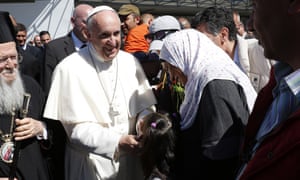In a hugely symbolic move seen as a lesson in solidarity for Europe,
Francis, who is the son of Italian migrants to Argentina, took 12
Syrians from three families – all of them Muslims – home with him to the Vatican on Saturday.
“All refugees are children of God,” the 79-year-old pontiff said on
the flight back to Rome, adding that though his gesture was “a drop in
the ocean” he hoped “the ocean will never be the same again”.
In an interview with the Italian daily newspaper La Stampa, the
families, who spent their first night in Rome at a Catholic charity,
expressed their gratitude for the pope’s “gesture of hope”.
“We saw friends and relatives die in the rubble, we fled Syria
because we no longer had any hope,” said Hasan, an engineer from
Damascus, who arrived in Italy with his wife, Nour, and two-year-old
son.
After fleeing to Turkey, he and his family set out for Europein a
rubber dinghy that sailed from the Turkish coast to Greece. “But it was
overloaded,” he said, recalling the pitch black of the sea at night and
the waves rocking the vessel.
“In Lesbos, we understood that we were stuck in a place that we could
not leave, [we were] in a trap, a prison”, he said. He described the
pope as a saviour for taking them off the island, where thousands of
migrants risk being sent back to Turkey under a new deportation deal
between the EU and Turkey.
Pope Francis
spoke emotionally on Sunday of his meeting with migrants and refugees
on Lesbos. Addressing worshippers at his weekly Angelus prayer in St
Peter’s Square, the pontiff related his visit to a migrant processing
centre, where about 3,000 people are being held.
“We greeted around 300 of them, one by one,” said Francis, who was
accompanied on his visit by the Ecumenical Patriarch Bartholomew and
Archbishop Ieronymos of Athens.
“There were so many children. Some of these children witnessed their
parents and friends dying, drowned at sea. I saw such suffering,” he
said.
He went on to tell of one particular case, “that of a young man, who was not even 40”.
“I met him yesterday with his two sons. He was Muslim and told me he
had married a Christian, [and that] they loved and respected each
other,” he said. “She had her throat slit by terrorists because she
would not renounce Christ and abandon her faith.”
Wafa, another of the refugees on the papal flight from Lesbos with
her husband Osama, eight-year-old daughter Masa and six-year-old son
Omar, told La Stampa of the constant bombardments the experienced around
their home.
“Since then [my son] has barely spoken … he is locked in an
impenetrable silence,” she said. “Even today, he wakes up every night
crying and we cannot get him to play with his sister.”
Wafa said she and her husband, who are from the Damascus suburb of
Zamalka, had opted to cut ties with the past. “We know we took the right
decision,” she said. After their stay on Lesbos, which seemed
interminable “Francis gave us a new life,” she said.
Ramy, a 51-year-old teacher from the eastern city of Deir Ezzor,
which is occupied by Islamic State, fled Syria with his wife Suhila and
three children – sons Rashid, 18 and Abdelmajid, 16, and daughter Al
Quds, seven – after their home was destroyed in the war.
“We discuss a lot and find it hard to imagine what life will be like
in the future. We don’t know whether we will start over in Europe or
whether, one day, we will be able to return to a Syria free of war and
violence,” he told La Stampa.
“We are grateful to the pope, we will prove ourselves worthy of this opportunity and the gift he gave us,” he said.
The three families, who had initially set their sights on reaching
Germany or another European country, were expected to seek asylum in
Italy.
Their arrival brings to about 20 the number of refugees living in the Vatican,
which has fewer than 1,000 inhabitants. A similar intake across Europe
would see 6 million people given asylum on the continent of 300 million.
Last year, the pope appealed to every Catholic diocese in Europe to
take in a refugee family, an appeal that fell on deaf ears across most
parts of the continent.
The number of migrants arriving in Greece has fallen drastically
since Turkey agreed to take back all those landing on the Greek islands
in return for billions in EU cash and other concessions.
More than 1.1 million people have crossed clandestinely from Turkey
to Greece since the start of 2015, and hundreds have drowned en route. The Guardian

No comments:
Post a Comment